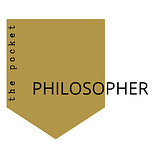Fellow philosophers,
Welcome to another day in our study of timeless wisdom. Yesterday we surveyed the philosophy of Moses the religious branches which his life fostered, and today we pivot toward another influential tradition which has touched all corners of the world: Islam.
I sense a deep humility in approaching this topic because, unlike much of the other topics we cover here, I feel like I know so very little.
I’m lucky enough to have had some very informative and intimate experiences with Muslim communities in my city—the local Islamic Center opens its doors many times throughout the year—but these experiences and the relationships I’ve cultivated there have really served to demonstrate how little I know about this rich and complex tradition.
In some ways that makes today’s installment that much more exciting, but I also recognize I could use some help.
That said, if you are an ardent student of Islamic philosophy, please feel free to jump in with corrections, clarifications, or comments, I would love to hear from you.
For anyone to whom this topic is unfamiliar, Mohammed is the founder of the Islamic faith—a rich tradition which would spread rapidly around the world and continues to be practiced today.
There exists separate from mainstream Islam a branch of study referred to as Islamic Philosophy. Primarily, this work is meant to contextualize and rationalize elements of Islamic teaching. We’ll be leaning heavy on this discipline today.
Let’s dig in!
Epistemology
In preparing for this newsletter, I surmised that Islamic epistemology is largely based on three sources:
Empirical Observation (think scientific method, where the work of Islamic Philosophy is done)
Divine Revelation/Qur’ran (not dis-similar to that of Christianity or Judaism and Biblical Texts)
Deep Seated cultural values which inform the way life is interpreted and experienced. These values vary all over the world.
Together, these forms represent the primary way in which followers of Islam acquire and grow their knowledge.
It’s quite a robust and well formulated process upon which wonderfully complex and resilient societies have emerged.
Ontology
I find this a difficult topic to clarify (and I think that’s exciting!)
I don’t sense that Islam is an entity which has a sort of direct comparison to other “religions” in that it umbrellas so many sub-disciplines throughout history.
For example, Islamic philosophers have made some of the most revolutionary contributions in the field of logic, algebra, and mathematics. Swaths of Islamic scholarship (this to say, Islamic scholars who sought spiritual answers in academics) spent their time studying the intricacies of the universe not necessarily imagining the image or figure of a god character. Rather, they studied the laws and elements of the universe and emanations of a divine order.
In this way, it’s not uncommon to find multiple ontologies—or objects of study—in various branches of Islam.
However, it does seem that any chosen object of study has a larger, deeper aim to understand the relationship between divinity and humanity in a meaningful way.
Ethics
As we can see, the Islamic world is beautifully diverse. Like epistemology and ontology there are various ethical paths one could observe. However, there are a few central ideas common to most, if not all, Islamic thought.
A primary example of such unity is in the observance of a central ethic. This ethical construct is found in the 5 Pillars of Islam.
They are as follows:
Declaration of Faith
Prayer
Giving/Alms/Charity
Fasting
Pilgrimage
While this is indeed a topic into which we could dig much deeper, this is a great cursory overview.
Greatest Work
Without knowing much about external commentaries or alternative texts, I would point toward the Qur’ran. I’ve only read some portions myself, but it’s a text I’d be very interested to learn more about in the future. It serves a central identity, reference, and inspiration for almost every expression of Islamic faith.

I would love to hear any further information or knowledge you’d like to share! I hope you enjoyed this brief overview and I look forward to being back with you tomorrow!
Until then,
Matt
Resources:
https://aip.scitation.org/doi/abs/10.1063/1.5094028?journalCode=apc
https://www.britannica.com/biography/Muhammad
https://www.ontology.co/islamic-philosophy.htm
https://www.newworldencyclopedia.org/entry/Islamic_philosophy
https://en.wikipedia.org/wiki/Islamic_ethics
https://en.wikipedia.org/wiki/Five_Pillars_of_Islam










